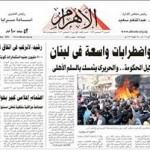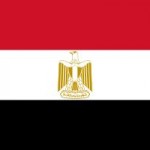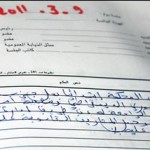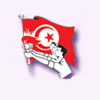Tunisia’s Jasmine Revolution
14 January, 2011

This collection consists of websites documenting the revolution in Tunisia in 2011. Partners at Library of Congress and Bibliothèque Nationale de France have contributed websites for this collection, and the sites are primarily in French and Arabic with some in English.
*************
Tunisia lifts censorship on books, movies import
22 January 2011 | 22:46 | FOCUS News Agency
Home / World
Tunis. The import of books, magazines and movies in Tunisia no longer requires initial permission, announced the administration of the customs services in the country, AFP reports.
The import of all kind of information carriers, which so far required initial permission from the censorship watchdog, will enter the country freely.
See also:
————————————————————–
BLOGS
- Nawaat, (Tunisian group blog / video-sharing)
- (Slim Amamou, a dissident blogger who joined the Government as Youth & Sports Minister)
- Tunisia Watch
*************
March 11, 2011
Tunisian Bloggers Win Online Press Award
Press watchdog Reporters Without Borders has awarded its Netizen award to a Tunisian blogging group that played an important role in the uprising that led to the January ouster of the North African country’s longtime autocratic leader.
A jury of press specialists chose the Netizen winner — blogging group Nawaat.org, which is granted a euro2,500 ($3,450) prize. Riadh Guerfali, or Astrubal, accepted the award Friday.
The prize is backed by Google because, as regional president Carlo d’Asaro Biondo said in a statement, it “defends our company’s core values”: making information accessible to all.
RSF Secretary General Jean-Francois Julliard said Net freedom is fragile with 119 people currently detained for expressing opinions online, mainly in China, Iran and Vietnam.
************************
Tunis – Mardi 25 janvier 2011
Annulation des autorisations d’importation des livres et des publications
Il est interdit d’interdire
L’administration générale de la douane a publié, samedi dernier, un communiqué déclarant que l’importation des livres, des publications, des CD ROM, des films et de tous les supports électroniques n’est plus soumise à une autorisation préalable. Le communiqué destiné aux services de la douane et au public, précise que le système Sinda sera actualisé à la faveur de cette décision.
Jusqu’ici l’importation de ces supports était soumise à la censure du ministère de l’Intérieur.
Cette décision est conforme à l’engagement pris par le gouvernement d’union nationale d’instaurer la liberté totale de l’information. C’est dans cet esprit que le ministère de la communication, organe de propagande et de censure des médias à été supprimé.
Ainsi, les Tunisiens pourront avoir accès à tous les livres interdits, qui allaient de “La régente de Carthage” au “Guide du routard”. Ils sont d’ores et déjà exposés sur les vitrines de certaines librairies, bien qu’ils ne soient pas encore tous disponibles à la vente, faute de livraison.
Aussi, les journaux français interdits sont enfin disponibles, de Libération au Monde en passant par le Canard enchainé.
Liste non exhaustive de livres anciennement
interdits établie par la Ligue des Ecrivains Libres
* Jalel al Touibi, “Militant malgré lui” (nouvelles) 123 p., 1995, 2ème éd., 2004, 176 p.
* Abdelwahab al Mansouri, “Rien ne me plait”, (poèmes), 2003 ;
* Samir Ta’mallah, “Dits en marge de l’interrogatoire” (poèmes) ;
* Mohamed Al Chabbi, “Un témoin a dit”, poèmes, Edition Al Akhilla, 1999 ;
* Abdel Rahmane Abid, “De l’orientation démocratique et de la réconciliation nationale”, Tunis, 1989 (en arabe) ;
* Ibrahim Darghouthi, “Le pain amer” (nouvelles en arabe), Dar Samed, 1990 ;
* Abdel Jabbar Al Ich, “Poèmes pour l’Irak”, coédition Dar Samed (Tunisie) et Dar al Hikma (Algérie), 1991 ;
* Fadhel Sassi, “Mon destin est de partir”, poèmes et nouvelles choisies par Sabah Sassi et Jelloul Azzouna, éd. journal Al-Cha’ab, 1994 ;
* Tawfik al Bachrouch, “Notre femme à travers nos fetwas”, (cent fetwas sur mille ans) ;
* Mohamed el Hédi Ben Sabagh, “Le retour de Azza, l’émigrée”, 235 p. (nouvelles), Ed. Bouzid, 1994 ;
* Hicham Al Karoui, “L’aigle et les frontières”, Dar al Nawras, 1989 ;
* Sadok Charaf, “La grande catastrophe, ô ma patrie”, poèmes, Al Akhilla, 1990 ;
* Mohamed Talbi, “Les enfants d’Allah” ;
“Le musulman à travers l’histoire”, collectif, Faculté des Lettes de la Manouba ;
* Afif Al Bouni, “De la stabilité politique en Tunisie”, 1997 ;
* Tawfik Ben Brik, “Maintenant, écoute-moi”, poèmes, Exils et Aloès Editions, 2000 ;
* Tawfik Ben Brik, “Ben Brik au Palais”, coédition Maison Al Kaws – Al Nahar (Tunis-Beirut), 2000 ;
* Mohamed Ammar Khawaldya, “Le discours utile sur le nouveau régime”, Edition à compte d’auteur, 2001 ;
* Ali Azizi “Les ailes du silence” (nouvelles) 2001 ;
* Moncef Marzouki. “Le voyage”, 2002 ;
* Jelloul Azzouna, “Liberté et littérature, même identité”, Dar Sahar, 232 p., 2002 ;
H.A.
************
Ben Ali’s Party Officially Dissolved
 TUNIS, March. 9, 2011 – The Democratic Constitutional Rally Party RCD has been officially dissolved after the ruling on Wednesday morning by the court of first instance of Tunis.
TUNIS, March. 9, 2011 – The Democratic Constitutional Rally Party RCD has been officially dissolved after the ruling on Wednesday morning by the court of first instance of Tunis.
“The court of first instance of Tunis ruled that the RCD be disbanded and its funds and property liquidated through the state property department” the ruling says.
The announcement was followed by a burst of jubilation, applause and chants by the crowd gathered at the court and in the neighbouring street, reports a TAP news agency journalist.
Lawyer Faouzi Ben Mrad representing the Interior Ministry which filed the request, said that the dissolution of the RCD had today fulfilled one of the major objectives of the revolution.
He said this is not a final judgment since defendants can appeal against it, adding that however the appeal did not defer the implementation of the decision.
But in the absence of RCD lawyers, no reaction of defendants could be obtained.
♣♣♣♣♣♣♣♣♣♣♣♣♣♣♣♣

A court on Tuesday dropped charges against a policewoman whose dispute with a fruit vendorwho later killed himself — sparked a chain of events that unleashed uprisings around the Arab world.
فايدة حمدي ل«الشروق»: هذه حقيقة ما جرى بيني وبين الشهيد البوعزيزي
حاورها: سفيان الأسود
تونس ـ «الشروق»:
لم يكن سهلا أن نتحدث عن فايدة حمدي «الشهيدة الحية» عون التراتيب التي أنصفها القضاء في قضية محمد البوعزيزي تحملت فايدة وزر قضية وتهمة كانت بحجم كل الدنيا.. عانت السجن ودفعت ثمنا باهظا لجريمة لم ترتكبها وجدت فايدة حمدي نفسها وحيدة أمام كل التونسيين وأمام كل العالم الذي اعتبرها ونظر إليها كمذنبة في حين كانت فايدة تقوم بواجبها وكانت كما تقول «أقوم بواجبي باعتباري أتقاضى مرتبي من الضرائب التي يدفعها الشعب» أهلها وعائلتها ومحاميتها فقط وبعض الأحرار في تونس وقفوا مع فايدة عندما كانت في محنتها وفي سجنها…
داخل السجن تعاطف معها المساجين والسجانين… كانوا معها في كل لحظة وفي كل حين… لم تكن فايدة وحدها في السجن كانوا هم معها في الوقت الذي كان فيه الوطن والعالم يتحدث عنها كمذنبة. لكنها كانت بريئة وكان هناك من يريد أن يحملها ذنبا لم ترتكبه.
الكل يعرف فايدة… موظفة تقوم بواجبها ومنضبطة للقانون…الكل يعرف تلك المرأة التي اشتغلت في التراتيب البلدية بكل حرص وبكل انسانية.
«الشروق» تحدثت مع فايدة حمدي «الشهيدة الحية».
فايدة، كيف كانت الحادثة مع البوعزيزي يوم 17 ديسمبر وهل كنت تتوقعين ردّ فعله؟
ـ لقد كنت أقوم بعملي في اطار القانون وأنا لم أمنع المرحوم محمد البوعزيزي من بيع بضاعته، بل طلبت منه عدم الانتصاب بذلك المكان وقبل يوم من وقوع الحادثة كان أصحاب محلات الخضر في سيدي بوزيد قد اعتصموا وطالبوا بتطبيق القانون ضدّ الانتصاب الفوضوي ثم أنني أعرف البوعزيزي من خلال عملي ولم أتوقع منه أن يرد الفعل بحرق نفسه خاصة أنه تصرف تجاهي بجذبي من زيي الرسمي كما قام بجذب الشعار الذي كنت أرتديه ورغم أن زملائي حينها طلبوا مني تقديم قضية عدلية ضده بتهمة الاعتداء على موظف إلا أني رفضت.
هل كنت تطبقين القانون بحزم كبير وهو ما آثار ردّ الفعل بتلك الطريقة؟
ـ الكل يعرف أنني قبل كل شيء موظفة أعمل وفق القانون وضدّ الفوضى ولكن في سيدي بوزيد يعرف الجميع أنني دائما أطبق القانون مع مراعاة الظروف الاجتماعية والانسانية وأنا أستغرب ردّ الفعل بتلك الطريقة فهناك مواطنون صدرت ونفذت ضدهم قرارات هدم في اطار القانون وأنا كنت ولازلت دائما أقف مع الحق وأراعي كل الظروف الاجتماعية والانسانية وكل من في سيدي بوزيد يعرف ذلك.
كيف كان التعامل معك في السجن؟
ـ إنني أتوجه بالشكر الى كل العاملين في السجن والى كل السجينات على التعامل الجيد معي وعلى تقديم المساعدة لي… داخل السجن الكل كان متعاطفا معي والكل كان يؤمن بأني مظلومة وبريئة… لقد كان الجميع معي في حين كان الاعلام ضدي ويقدمني كمذنبة.
لكن الاعلام وقف معك بعد ذلك؟
ـ إنني ألوم الاعلام بشكل كبير، الاعلام كان متحاملا ضدّي ولم يكن محايدا وقدمني لكل العالم كمذنبة في الوقت الذي لم يقل القضاء كلمته. لقد تمّ منع عائلتي من تقديم وجهة نظرها وموقفها والصورة الحقيقية للحادث كما أن وسائل الاعلام لم تبحث عن الحقيقة، بل انساقت وراء التيار… كان من المفروض أن يساهم الاعلام في كشف الحقيقة وفي نصرة المظلوم فأنا مواطنة تونسية كان من المفروض أن يكون لي الحق في الدفاع عن نفسي فأنا طيلة حياتي المهنية أعمل على انصاف الحق وانصاف الناس.
هل طلبت محاكمتك عندما تم اعتقالك؟
ـ نعم كنت أطالب بمحاكمتي وطلبت ذلك من حاكم التحقيق لكنني تعرضت للظلم من النظام السابق قبل 14 جانفي ثم تعرضت للظلم من الاعلام الذي قدمني كمذنبة.
لكن من كان وراء اشاعة خبر أنك اعتديت على محمد البوعزيزي؟
ـ لا أعرف، لكن اسأل من هو في سيدي بوزيد لقد كنت الشماعة التي علقوا عليها المظلمة، لكن الحقيقة ظهرت وأنصفني القضاء التونسي المستقل؟
محاميتك الأستاذة بسمة الناصري وقفت معك حتى النهاية وكانت منذ الوهلة الأولى مقتنعة ببراءتك؟
ـ أتوجه بالشكر الكبير الى محاميتي الأستاذة بسمة الناصري كل الشكر لها وكل الشكر لمن وقف معي وأشكر كل أعوان التراتيب في كامل تراب الجمهورية وأشكر القضاء التونسي المستقل والنزيه وأشكر كل أحرار تونس والعالم وأشكر خاصة كل أهالي سيدي بوزيد الذين وقفوا معي ومع عائلتي.
متى تعودين إلى عملك؟
ـ لا أعلم أنا الآن أتلقى العلاج، صحتي متدهورة جدّا وأحتاج الى العلاج…
هل ستطالبين بالتعويض باعتبارك بريئة والقضاء أنصفك؟
ـ ليست لي إجابة الأمر يهم محاميتي الأستاذة بسمة الناصري المناصري التي أشكرها على كل ما بذلته وقامت به…
 *********************************************************************
*********************************************************************










